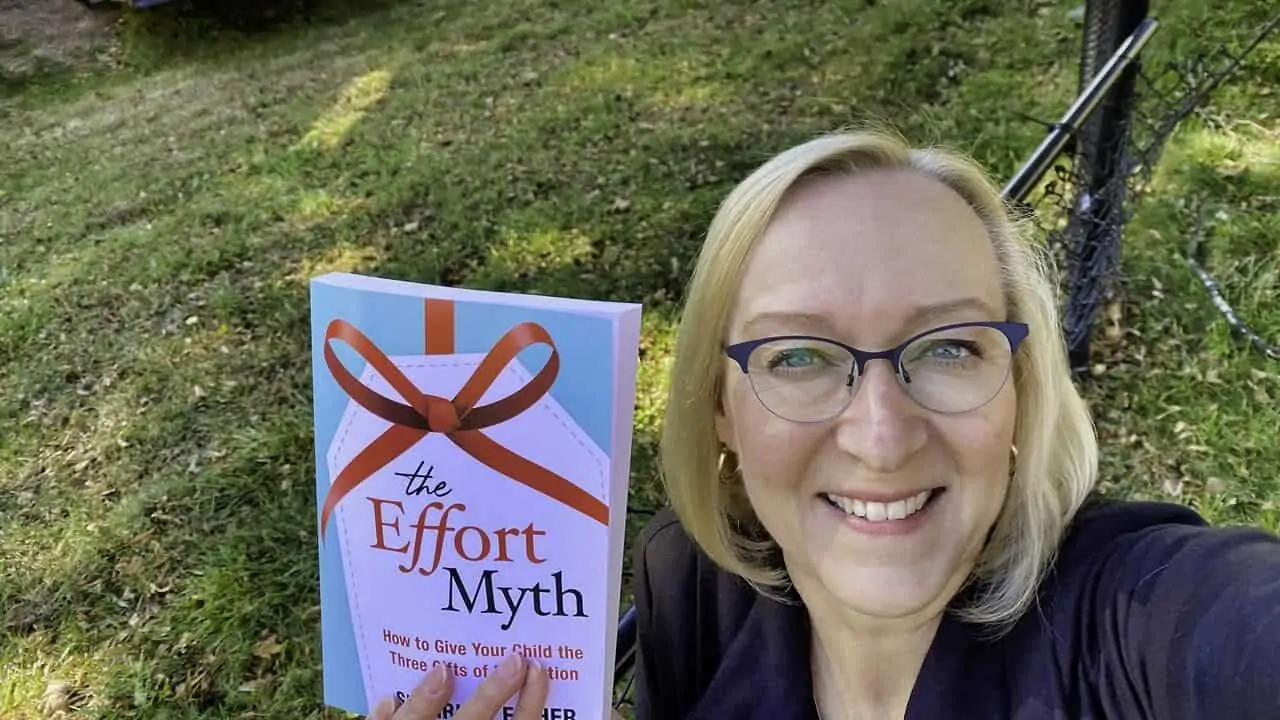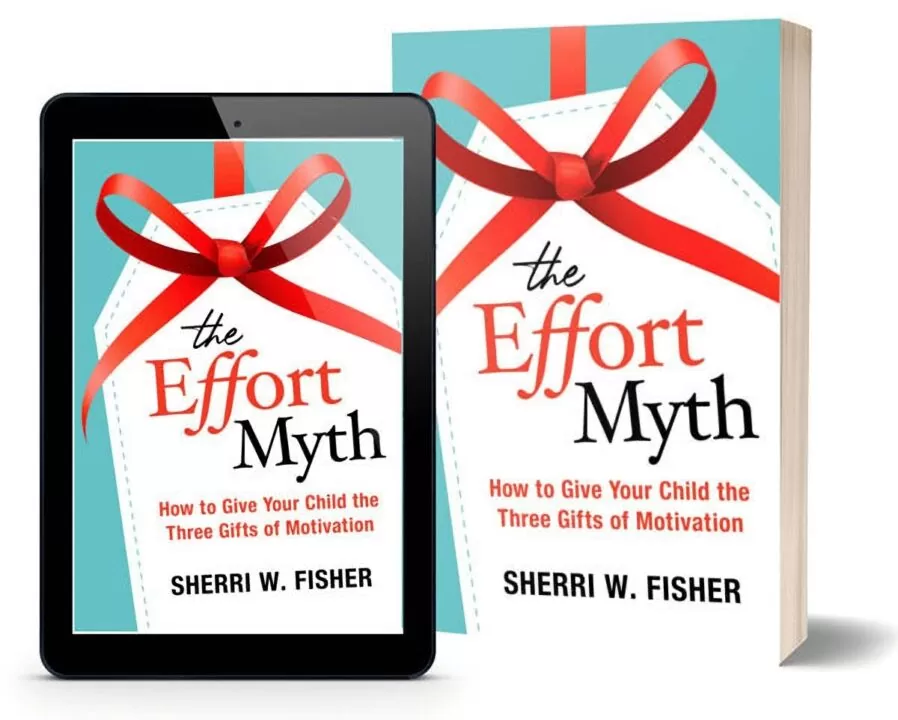Today's Sunday • 9 mins read
“Trying harder is not sufficient by itself. That’s because it’s not how hard you try that leads to success; it’s how you try hard.”
Says Sherri W. Fisher, a learning specialist, and Positive Education expert.
Sherri has more than 30 years of expertise in helping talented adolescents and young adults who were struggling with learning, attention, and executive functions to reach their full potential.
Her new book is called The Effort Myth: How To Give Your Child The Three Gifts of Motivation.
It is a guide to help parents participate more effectively in their children’s education. The book tells you how, as a parent, you would know when to step in, and when to let your kids work on their own.
- It helps you break away from the myth that your child must work hard to achieve success.
- It answers the common parental challenge. “How can I help my child access their smartness?”
- It also teaches how to build emotional safety for your child even when you cannot yield to their wishes.
The Effort Myth explores the three primary gifts (competence, choices, and self-direction) that parents can give their children to help them become independent, lifelong learners.

Sherri Fisher has written more than 50 research-based articles. She has also co-authored the first book applying positive psychology to education, SMART Strengths: Building Strengths, Resilience and Relationships.
Here we interview her on her life and her book:
1. What inspired you to write “The Effort Myth?” What message do you want the title to convey?
Sherri Fisher (SF): I jokingly say that I have been writing this book for over 30 years.
When I was a classroom teacher in my twenties, I had a sign on the wall that read, “It’s not how hard you try that leads to success; it’s how you try hard that matters most.”
The Effort Myth is the story that adults tell about a student who seems smart enough to be successful, but who is struggling to achieve, especially in school. “If they would just try harder…”
Like other myths, the effort myth is a widely held belief that is false. Successful students do more than just try. They try differently. I tell the students I coach,
“It’s not how hard you try that leads to success. It’s how you try hard.”
Using the ideas in The Effort Myth book, adults can help students learn how to spend their effort effectively in ways that move them forward.
2. Can you tell us about “The Effort Myth?” What curiosity does your book spark in a reader?
SF: I hope that people ask if the effort is not the answer, what is? That’s what The Effort Myth is really about.
I believe no one should suffer to become an effective learner. Often, children would try harder if they only knew how.
It can be easy to see a lack of motivation as your child’s own problem to fix.
The truth is that your child depends on relationships with others, especially with their parents, to launch the behaviors that lead to independence.
3. You’re a MAPP from U Penn. Would you categorize your book as Positive Psychology?
SF: Yes, I graduated with the first MAPP class at UPenn. I am extremely grateful to have been taught by all of the founders of the field. Chris Peterson was my advisor.
Everything I write is positive psychology-based. The “A” in MAPP stands for “Applied”, so The Effort Myth holds true to that by not just restating research but instead by showing it in action.
I have two other books that teach positive psychology directly, in tiny bites. Those books, Positive Edge Journal, published in Australia, and Unleash Your Epic Self, published in the United States, deliver small amounts of research coupled with a research-based action that can be taken and reflected upon. These are workbooks and can be self-guided or delivered by a facilitator.
I also co-wrote the first Positive Education book, SMART Strengths, which does cite all the research we used.
The Effort Myth is different. It embeds positive psychology learning by weaving it throughout a variety of stories, but without naming it for the most part. I do talk specifically about resilience, but I have my own names for positive psychology topics.
I use the language that has resonated with my audience over years of discovering what sticks. That’s also why there are no citations. I do, however, have a list of researchers who inspired my work in the acknowledgments.
4. How long did the book take in its making? How was your journey from coming up with an idea to writing the final word?
SF: I had been promising parent-clients that I was going to write this book for years, and finally I just decided I would do it.
In late December 2020, I joined Theano Coaching’s Writers Workshop. I chose groups that met every other week. I created the content by listening to myself when I met with clients and by taking notes on stickies rather than on whole pages. Once I had about 200 or so notes, I sorted them into rough categories stuck to my whiteboard, and I wrote chapters based on this.
I also discovered that even though I am a night owl, I wrote well first thing in the morning, starting around 5 or 6 o’clock. And also on weekends, when I carved out several hours for editing what I had written during the week. I worked more than full-time, so no writing happened during the workday.
I wrote the original manuscript in just seven months this way, arranged according to a trial table of contents. Then, I workshopped and revised it, and it was almost a book.
This manuscript was completed in mid-June, 2021. I had a wonderful editor, Kathryn Britton, who helped me by breaking that into 270 pieces, more than I started with! Once I got over the shock, I wrote a new outline and reassembled the content according to that.
It was also delivered to several beta readers, whose comments helped shape the editing. The first two phases of the editing process were done remotely. We met in August in person to finalize the editing and prepare the final document that would eventually become a published book.
I also had a project manager, Diana Needham, who guided the time frame. I designed the concept for my cover as well as interior graphics and was fortunate to work with talented graphic artists who created the final versions.
Amazingly, The Effort Myth gets published just 11 months after I started!
5. How do you strike a balance between work, writing, and family life? How do you unwind and have fun when away from your desk?
SF: I am fortunate to mostly work from home. Also, I genuinely like my clients, so most of the time working is fun! While my schedule is often dictated by the needs of clients, I can sneak out into the yard to play with my dogs or work in the garden.
I live near many beautiful places for walking, hiking, and kayaking. I have wonderful friends, many of whom are from MAPP and I see them on Zoom and some even in person.
My children who you will read about in the book are now grown into lovely, fun adults who are on their own.
6. One of the most inspiring taglines of your book is, “It’s not how hard you try that leads to success; it’s how you try hard.” If you were on a TED stage, what parting advice would you give to your audience?
SF: The Effort Myth story broadcasts a false promise of success tinged with fear. Just asking your children to try harder is unlikely to solve their education challenges.
The effort myth that is told about student learning may be just a story, but it perpetuates the belief that success is the reliable outcome of trying harder. It also broadcasts a series of implicit warnings:
- If you do not try harder, you may fail.
- If you fail, you will have a less attractive future story.
- If you have a less attractive future story, it may be your own fault.
In this myth, teachers, and sometimes by extension, parents, plead with students to heed their warnings. “I believe in you,” they say. “I know you can do it if you try harder,” they encourage. Though their intention is to motivate action, this approach can instead discourage it.
Of course, the effort is necessary for work to be done successfully. However, trying harder is not sufficient by itself.
Often, focusing on effort makes motivation problems worse, minimizing a child’s real needs, wearing away at their belief in their own abilities, and decreasing their love of learning. They may accumulate fear of not measuring up, which can lead to anxiety.
What’s also heart-breaking about the “Just try harder” approach is that it can mask students’ real strengths, keeping parents, teachers, and students from seeing what is good and even powerful about them. Education need not be about creating barriers to learning. Learning is every person’s birthright.
Instead, we can give every child The Three Gifts of Motivation: Academic and emotional skills that lead to competence; Structure that leads to effective habits for supporting quality choices, and tools for creating hopeful, purposeful self-direction.
Thank you!
Author Sherri Fisher earned her Master’s Degree in Applied Positive Psychology from the University of Pennsylvania, where she studied with the founders of the field. She is the director of Learn & Flourish — an education and coaching firm. Thousands of her clients have gone on to flourish in school, work, and life.
• • •
Interviewed by Sandip Roy, a medical doctor, psychology writer, and happiness researcher. Founder and Chief Editor of The Happiness Blog. Writes popular science articles on happiness, positive psychology, and related topics.
√ If you enjoyed this, please share it.
